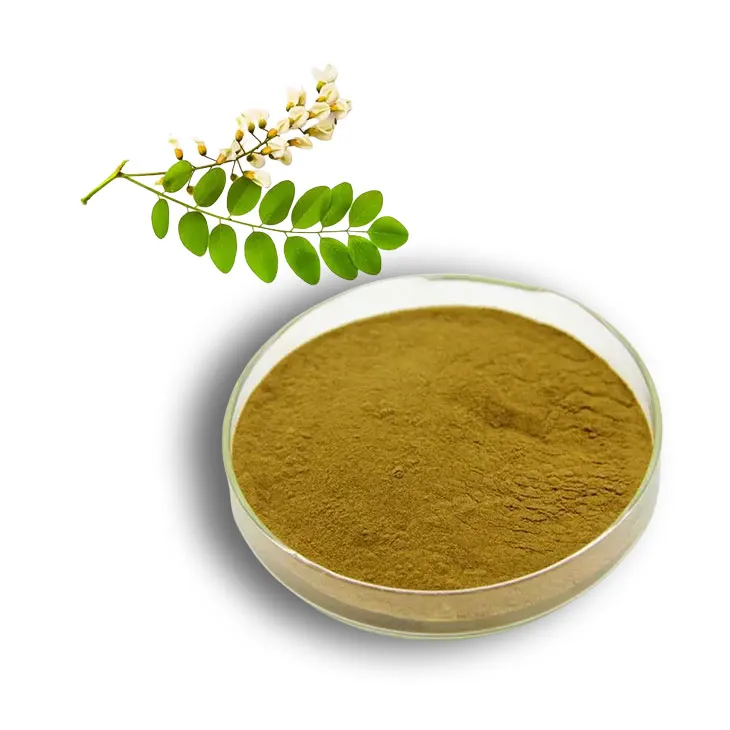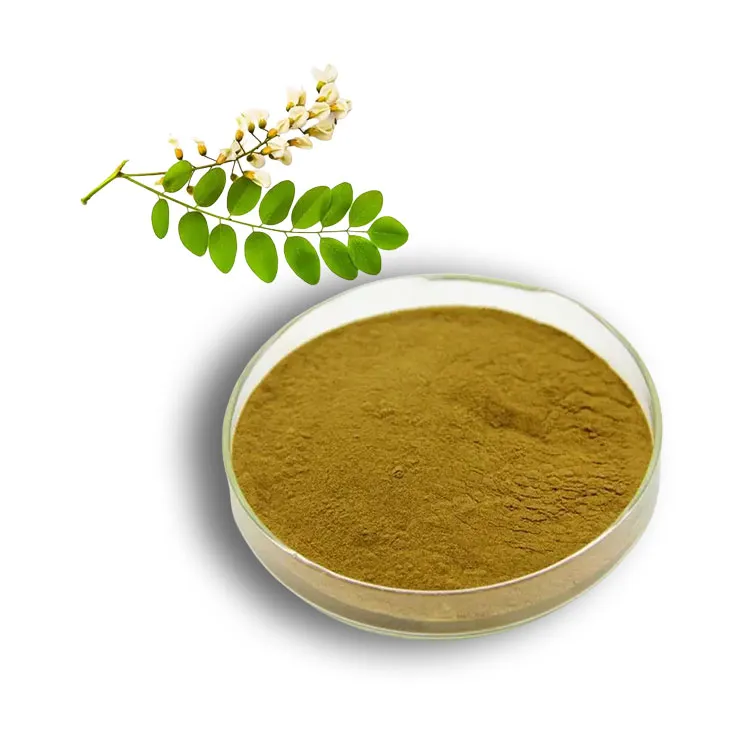- 0086-571-85302990
- sales@greenskybio.com
The Optimal Bioavailability of Sophora japonica Flower Extract.
2024-11-30

1. Introduction
Sophora japonica flower, a traditional Chinese medicinal material, has been widely used for its various potential health benefits. The extract of Sophora japonica flower contains a rich array of chemical components, which play important roles in different applications. However, to fully utilize these beneficial components, achieving optimal bioavailability is crucial. Bioavailability refers to the fraction of an administered dose of a drug or a bioactive compound that reaches the systemic circulation and is available at the site of action. In the case of Sophora Japonica Flower Extract, understanding and enhancing its bioavailability can lead to more effective use in medicine, health products, and other fields.

2. Chemical Composition of Sophora Japonica Flower Extract
2.1 Flavonoids Flavonoids are one of the major components in Sophora Japonica Flower Extract. For example, rutin is a well - known flavonoid present in it. Flavonoids are known for their antioxidant, anti - inflammatory, and anti - microbial properties. Their chemical structures with phenolic rings and conjugated systems contribute to these biological activities. The presence of multiple hydroxyl groups in flavonoids also affects their solubility and interaction with biological membranes, which in turn has an impact on their bioavailability.
2.2 Triterpenoid Saponins Triterpenoid saponins are another important group of compounds in the extract. These compounds have complex structures consisting of a triterpene aglycone and sugar moieties. They possess various biological activities such as anti - tumor, immunomodulatory, and hypolipidemic effects. The hydrophilic nature of the sugar moieties and the hydrophobic nature of the triterpene part influence their solubility and absorption in the body, thus affecting bioavailability.

3. Forms of Ingestion and Bioavailability
3.1 Oral Ingestion
Oral ingestion is the most common way to take Sophora japonica flower extract. When taken orally, the extract has to pass through the gastrointestinal tract. The acidic environment in the stomach and the enzymatic activities in the intestine can significantly affect the stability and bioavailability of the components. For instance, some flavonoids may be hydrolyzed by stomach acid or intestinal enzymes, which may either enhance or reduce their bioactivity and bioavailability.
The absorption of the extract components in the intestine is also a complex process. The presence of food in the intestine can influence the absorption. For example, certain dietary fibers may bind to the components of the extract, reducing their availability for absorption. On the other hand, some food components may enhance the solubility of the extract components, facilitating their absorption.
3.2 Parenteral Administration
Parenteral administration, such as injection, bypasses the gastrointestinal tract. This method can avoid the degradation and loss of components in the digestive system. However, it also has its own challenges. Injectable forms of Sophora japonica flower extract need to be carefully formulated to ensure stability, solubility, and biocompatibility. In addition, parenteral administration may cause local irritation or systemic immune responses, which need to be carefully monitored.

4. Influence of Processing Methods on Bioavailability
4.1 Extraction Methods
Different extraction methods can result in extracts with different chemical compositions and bioavailabilities. For example, traditional solvent extraction methods may extract a wide range of components, but some of the more polar or non - polar components may be lost depending on the solvent used. Supercritical fluid extraction, on the other hand, can provide a more selective extraction of certain components, which may have a higher bioavailability.
The extraction time and temperature also play important roles. Longer extraction times or higher temperatures may cause degradation of some heat - sensitive components, reducing their bioavailability. For example, excessive heat during extraction may cause the breakdown of flavonoids, losing their antioxidant and other beneficial properties.
4.2 Preparation of Formulations
The formulation of Sophora japonica flower extract into different dosage forms can significantly affect bioavailability. For example, when formulating into tablets or capsules, the addition of appropriate excipients can improve the dissolution rate and absorption of the extract components. Microencapsulation is another technique that can protect the extract components from degradation in the gastrointestinal tract and enhance their controlled release, thereby improving bioavailability.
The use of nano - technology in formulating the extract is also an emerging area. Nano - particles can increase the surface area of the extract components, facilitating their interaction with biological membranes and enhancing absorption. However, the safety and long - term effects of nano - formulated Sophora japonica flower extract need to be further studied.
5. Strategies to Improve Bioavailability
5.1 Structural Modification Structural modification of the components in Sophora japonica flower extract can be a potential strategy to improve bioavailability. For example, chemical modification of flavonoids to increase their lipophilicity may enhance their absorption through cell membranes. However, this approach needs to ensure that the modified compounds still retain their beneficial biological activities.
5.2 Co - administration with Absorption Enhancers Co - administration with absorption enhancers can also be considered. For example, some natural or synthetic compounds can increase the permeability of the intestinal mucosa, allowing more of the extract components to be absorbed. However, the safety and potential interactions of these absorption enhancers with the extract components need to be carefully evaluated.
6. Applications in Medicine and Health Products
6.1 In Medicine In the field of medicine, the optimal bioavailability of Sophora japonica flower extract can lead to more effective treatment of various diseases. For example, its anti - inflammatory properties can be better utilized in treating inflammatory diseases such as arthritis. The anti - microbial properties can be enhanced for the treatment of infectious diseases. Moreover, the potential anti - tumor effects can be more effectively exploited for cancer treatment if the bioavailability of the relevant components is optimized.
6.2 In Health Products In health products, such as dietary supplements, the improved bioavailability of Sophora japonica flower extract can provide better health - promoting effects. It can enhance antioxidant defenses in the body, help in maintaining cardiovascular health, and contribute to overall well - being. Consumers can obtain more benefits from these products when the bioavailability of the extract is optimized.
7. Conclusion
In conclusion, achieving the optimal bioavailability of Sophora japonica flower extract is a multi - faceted issue that involves understanding its chemical composition, considering different forms of ingestion, and taking into account the influence of processing methods. By exploring these aspects and implementing strategies to improve bioavailability, the potential of Sophora japonica flower extract can be fully realized in medicine and health products. Further research is still needed to fully understand the complex mechanisms related to bioavailability and to develop more effective methods for enhancing it.
FAQ:
What are the main chemical components in Sophora japonica flower extract?
The Sophora japonica flower extract contains various chemical components. Some of the main ones include flavonoids, which are known for their antioxidant properties. There are also phenolic compounds and other bioactive substances. These components play important roles in determining the potential health benefits and bioavailability of the extract.
How does the form of ingestion affect the bioavailability of Sophora japonica flower extract?
Different forms of ingestion can have a significant impact on bioavailability. For example, if it is taken in a liquid form, it may be absorbed more quickly compared to a solid form. However, the formulation of the extract in tablets or capsules may also influence how it is released in the body. Factors such as solubility and the presence of other ingredients in the formulation can either enhance or reduce bioavailability.
What are the common processing methods for Sophora japonica flower extract?
Common processing methods include extraction using solvents such as ethanol or water. Thermal processing may also be involved in some cases. Another method could be purification steps to isolate specific components. These processing methods can affect the chemical composition of the extract and consequently its bioavailability.
Can the bioavailability of Sophora japonica flower extract be improved?
Yes, the bioavailability can be improved. This can be achieved through optimizing the processing methods, for example, by using more efficient extraction techniques to obtain a purer and more bioactive extract. Formulation into appropriate delivery systems, such as nanoparticles, can also enhance bioavailability. Additionally, combining the extract with certain substances that can promote absorption in the body may be beneficial.
What are the potential applications of Sophora japonica flower extract in medicine?
In medicine, Sophora japonica flower extract has potential applications due to its bioactive components. It may be used for its antioxidant effects, which could help in preventing oxidative stress - related diseases. It may also have anti - inflammatory properties, making it potentially useful in treating inflammatory conditions. However, more research is needed to fully understand and utilize its medicinal properties.
Related literature
- Bioavailability of Flavonoids from Sophora japonica Flower Extract: A Comprehensive Review"
- "The Influence of Processing on the Chemical Composition and Bioavailability of Sophora japonica Flower Extract"
- "Sophora japonica Flower Extract: Ingestion Forms and Their Impact on Bioavailability"
- ▶ Hesperidin
- ▶ Citrus Bioflavonoids
- ▶ Plant Extract
- ▶ lycopene
- ▶ Diosmin
- ▶ Grape seed extract
- ▶ Sea buckthorn Juice Powder
- ▶ Fruit Juice Powder
- ▶ Hops Extract
- ▶ Artichoke Extract
- ▶ Mushroom extract
- ▶ Astaxanthin
- ▶ Green Tea Extract
- ▶ Curcumin
- ▶ Horse Chestnut Extract
- ▶ Other Product
- ▶ Boswellia Serrata Extract
- ▶ Resveratrol
- ▶ Marigold Extract
- ▶ Grape Leaf Extract
- ▶ New Product
- ▶ Aminolevulinic acid
- ▶ Cranberry Extract
- ▶ Red Yeast Rice
- ▶ Red Wine Extract
-
Okra Extract
2024-11-30
-
Angelica sinensis extract
2024-11-30
-
Yohimbine Bark Extract
2024-11-30
-
Jujube Extract
2024-11-30
-
Buckthorn bark extract
2024-11-30
-
Purple Sweet Potato Extract
2024-11-30
-
Hawthorn powder
2024-11-30
-
Citrus Aurantii Extract
2024-11-30
-
Polygonum Cuspidatum Extract
2024-11-30
-
Lemon Juice Powder
2024-11-30





















